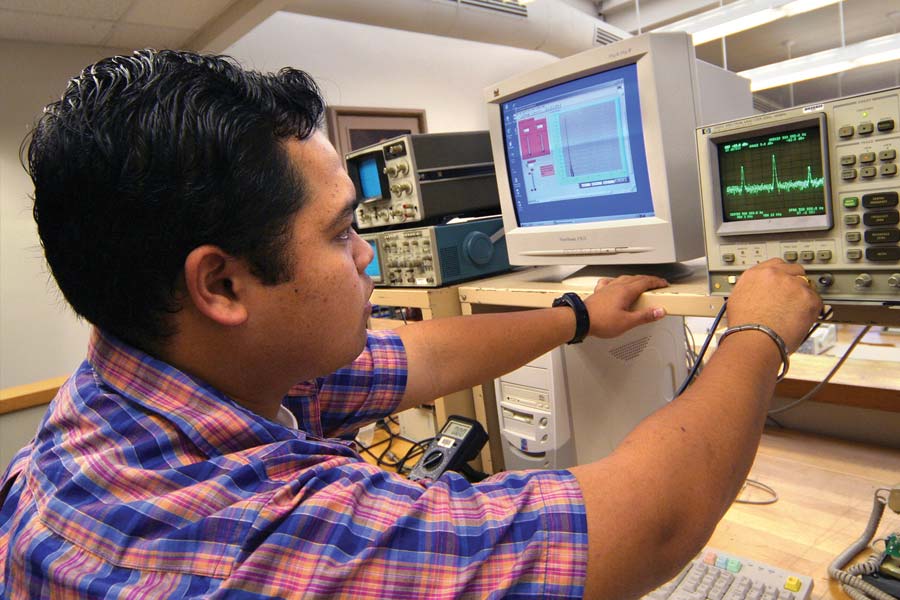Bachelor of Science (BS) in Electrical Engineering
![]()
Earn a Bachelor of Science in Electrical Engineering, be the power behind the machine
In an era defined by technological advancements and digital transformation, pursuing a Bachelor of Science in Electrical Engineering (BSEE) positions you right at the heart of the future. In a rapidly changing landscape, engineers are becoming increasingly crucial, with electrical engineers playing pivotal roles in the development and implementation of technology that powers our world. From renewable energy and telecommunications to robotics and artificial intelligence, a BSEE is a ticket to a rewarding and impactful career.
The Demand for Electrical Engineers
The world is more interconnected than ever before, relying heavily on technology for communications, health, transportation, entertainment, and a myriad of other facets of modern life. Behind this technology are electrical engineers. They design, develop, test and supervise the production of electrical equipment and systems, including electric motors, radar and navigation systems, communications systems, and power generation equipment.
According to the U.S. Bureau of Labor Statistics, the job outlook for electrical engineers is expected to grow steadily. This projection is likely to increase further due to the burgeoning fields of renewable energy, autonomous vehicles, and the Internet of Things (IoT), all of which require the expertise of electrical engineers. Graduates with a BSEE can anticipate plentiful opportunities, excellent job security, and attractive compensation.
A Diverse Range of Industries
A BSEE opens up a plethora of opportunities across a broad spectrum of industries. Electrical engineers are sought after in diverse sectors such as energy, telecommunications, manufacturing, defense, aerospace, automotive, and many more. This diversity of industries allows electrical engineers to apply their skills in various contexts, from designing smart grids for power distribution, to developing systems for autonomous vehicles, to crafting intricate circuit designs for advanced communication systems.
A Career that Drives Innovation
Electrical engineering is not just about sustaining the current technology landscape – it’s about shaping the future. As an electrical engineer, you will have the opportunity to pioneer advancements in areas such as renewable energy, artificial intelligence, robotics, and more. Electrical engineers drive innovation, creating solutions that address global challenges, from climate change to healthcare.
Intellectual Growth and Lifelong Learning
The field of electrical engineering is ever-evolving, with new technologies and methodologies constantly emerging. This dynamism fosters an environment of continuous learning, challenging electrical engineers to stay updated and adapt to these changes. Pursuing a BSEE is a commitment to lifelong learning, intellectual growth, and adaptability – qualities that are highly valued in the modern workforce.
Contribution to Society
Pursuing a BSEE is not just about securing a promising career – it's about making a meaningful contribution to society. Electrical engineers create technologies and systems that improve lives, from medical equipment that aids in diagnosing and treating diseases, to renewable energy systems that address environmental concerns, to communication systems that connect people around the world. The work of electrical engineers can have a profound impact on the world, often in ways that are not immediately visible to the average person.
A Bachelor of Science in Electrical Engineering is a wise investment in your future. It is a versatile degree that offers diverse job opportunities, a stable and well-compensated career, continuous intellectual growth, and the chance to make significant contributions to society. It positions you to not only participate in the future but also to shape it. As we continue to advance into the digital age, the need for electrical engineers will only become more critical, making a BSEE a stepping stone to a bright future.
As an electrical engineering student, you'll develop the skills necessary for a wide range of electrical engineering jobs, including design, analysis, and testing of electrical systems. You will study circuit design and simulation, digital signal processing, microcontrollers, digital circuit design, and communication systems. Potential employers include Lockheed Martin, Intel, Texas Instruments, Boeing, IBM, Tesla, Google, Apple, and many others. The program is a blend of theory and practice directed at engineering design, rather than research.
As you progress through the program, more theoretical methods of circuit modeling and computer-aided circuit simulation tools are taught, enabling you to design, build, test and analyze sophisticated circuits and systems. You can keep your engineering education broad-based or specialize in areas such as telecommunications, digital signal processing, integrated circuit design and control theory.
The program provides the essential knowledge to enter into the electrical engineering industry with careers, such as:
- Electrical Engineer - average salary, $75,2191
- Design Engineer - average salary, $67,6071
- Integration Engineer - average salary, $85,4441
- Project Engineer - average salary, $68,5701
- Research Engineer - average salary, $68,5701
- Applications Engineer - average salary, $70,7851
- Systems Engineer - average salary, $79,4551
Why Capitol?
Our location puts you in the heart of the action.
The Baltimore, Maryland/Washington D.C. area has one of the largest concentrations of high-tech companies, defense contractors, and government agencies in the United States, making it easier to find internships and high-paying jobs.
Our classes are taught by working professionals.
A field like electrical engineering is constantly evolving, which makes our faculty extremely valuable since many are experts in the field.
Our motto, ‘find a way, or make one’ delivers job ready skills.
Hands on classes, combined with extracurricular clubs like; League of Legends, the robotics club, and the gaming club help you hone the skills needed to excel in the workplace.
Support for you
Whatever type of resource you need –a way to improve your math skills, a place to exercise, help with a job search or a disability – we have facilities and personnel ready to help.
Top Employers of Capitol Technology University's Graduates
Career Opportunities
The Capitol Commitment
We’ve created a game plan to make sure you find a job upon graduation. Learn more.
Degree Details
The bachelor of science in electrical engineering degree (BSEE) is a total of 120 credits, which covers electrical engineering, technical courses, mathematics and sciences, English and social science courses.
Enrollment and graduation data for selected undergraduate degree programs is available at https://capl.ink/ABETUndergradData.
Tuition & Fees
Tuition rates are subject to change.
| Fall 2025–Summer 2026 | Fall 2026–Summer 2027 | |
|---|---|---|
| Tuition (per semester,12–18 credits) | $13500 | $13635 |
| Per-credit Tuition (over 18 credits) | $1125 | $1125 |
| Student Activity Fee (resident) | $189 | $204 |
| Student Activity Fee (commuter) | $106 | $115 |
| Information Technology Fee (per semester) | $440 | $450 |
| International Student Fee (per semester) | $824 | $824 |
| International Student Application Fee | $50 | $50 |
| Fall 2025–Summer 2026 | Fall 2026–Summer 2027 | |
|---|---|---|
| Tuition (per credit, on-campus, online, or independent study) | $869 | $875 |
| Student Activity Fee | $22 | $25 |
| Information Technology Fee (per credit) | $45 | $55 |
| Fall 2025–Summer 2026 | Fall 2026–Summer 2027 | |
|---|---|---|
| Tuition (standard rate, per credit) | $455 | $460 |
| Tuition (partnership rate, per credit) | $360 | $375 |
| Information Technology Fee (per credit) | $45 | $55 |
| Fall 2025–Summer 2026 | Fall 2026–Summer 2027 | |
|---|---|---|
| Tuition (active duty, per credit) | $250 | $250 |
| Tuition (retired duty, per credit) | $769 | $769 |
| Information Technology Fee (per credit) | $45 | $55 |
- All full-time students who keep their student account current are promised their tuition will not increase more than 1% per year for four years.
- Please visit our myCapitol portal housing costs page for details on Capitol Technology University's modern residential facility.
Related Information
The B.S. degree in Electrical Engineering is accredited by the Engineering Accreditation Commission of ABET (www.abet.org) under the commission's General Criteria and Program Criteria for Electrical Engineering.











